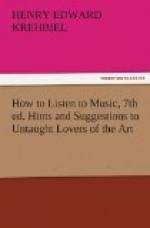“That he was no wild radical altering for the mere pleasure of alteration, or in the mere search for originality, is evident from the length of time during which he abstained from publishing, or even composing works of pretension, and from the likeness which his early works possess to those of his predecessors. He began naturally with the forms which were in use in his days, and his alteration of them grew very gradually with the necessities of his expression. The form of the sonata is ’the transparent veil through which Beethoven seems to have looked at all music.’ And the good points of that form he retained to the last—the ’triune symmetry of exposition, illustration, and repetition,’ which that admirable method allowed and enforced—but he permitted himself a much greater liberty than his predecessors had done in the relationship of the keys of the different movements, and parts of movements, and in the proportion of the clauses and sections with which he built them up. In other words, he was less bound by the forms and musical rules, and more swayed by the thought which he had to express, and the directions which that thought took in his mind.”
[Sidenote: Schumann and Chopin.]
It is scarcely to be wondered at that when men like Schumann and Chopin felt the full force of the new evangel which Beethoven had preached, they proceeded to carry the formal side of poetic expression, its vehicle, into regions unthought of before their time. The few old forms had now to give way to a large variety. In their work they proceeded from points that were far apart—Schumann’s was literary, Chopin’s political. In one respect the lists of their pieces which appear most frequently on recital programmes seem to hark back to the suites of two centuries ago—they are sets of short compositions grouped, either by the composer (as is the case with Schumann) or by the performer (as is the case with Chopin in the hands of Mr. Paderewski). Such fantastic musical miniatures as Schumann’s “Carnaval” and “Papillons” are eminently characteristic of the composer’s intellectual and emotional nature, which in his university days had fallen under the spell of literary romanticism.
[Sidenote: Jean Paul’s influence.]
[Sidenote: Schumann’s inspirations.]
While ostensibly studying jurisprudence at Heidelberg, Schumann devoted seven hours a day to the pianoforte and several to Jean Paul. It was this writer who moulded not only Schumann’s literary style in his early years, but also gave the bent which his creative activity in music took at the outset. To say little, but vaguely hint at much, was the rule which he adopted; to remain sententious in expression, but give the freest and most daring flight to his imagination, and spurn the conventional limitations set by rule and custom, his ambition. Such fanciful and symbolical titles as “Flower, Fruit, and Thorn Pieces,” “Titan,” etc.,




